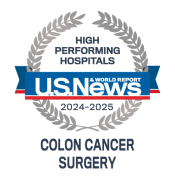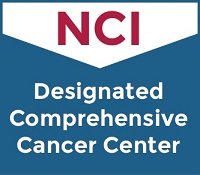Robot-Assisted Pancreatectomy Speeds Recovery Time for Busy Nurse
 I became a patient at the University of Maryland Medical Center (UMMC) because I had an incidental finding from a CAT scan at Upper Chesapeake Health (UCH). The scan revealed a pancreatic cyst/cystic neoplasm. Dr. A. Sood at UCH referred me to Dr. Peter Darwin at UMMC. Dr. Darwin performed an ultrasound-assisted endoscopy with biopsy. The biopsy revealed pre-cancer cells and an elevated CEA level. Dr. Darwin referred me to Dr. Nader Hanna at the University of Maryland Greenebaum Cancer Center (UMGCC).
I became a patient at the University of Maryland Medical Center (UMMC) because I had an incidental finding from a CAT scan at Upper Chesapeake Health (UCH). The scan revealed a pancreatic cyst/cystic neoplasm. Dr. A. Sood at UCH referred me to Dr. Peter Darwin at UMMC. Dr. Darwin performed an ultrasound-assisted endoscopy with biopsy. The biopsy revealed pre-cancer cells and an elevated CEA level. Dr. Darwin referred me to Dr. Nader Hanna at the University of Maryland Greenebaum Cancer Center (UMGCC).
All areas that I had contact with, from the registration area through my entire stay, was individualized and caring. I found Dr. Hanna to be professional and thorough. After reviewing my history, the pathology and biopsy report, we decided the best course of action was to be proactive and remove the cyst.
Dr. Hanna explained the surgical procedure along with the surgical options of laparoscopy with or without robotics. He recommended the robotic procedure because it would be less invasive, allow greater precision and a shorter recovery period. I was the first patient to have robot-assisted distal pancreatectomy at UMGCC.
I found the entire staff from the clinical setting through the OR, to the recovery/post op to be competent, attentive and patient-centered. I stayed in the recovery for seven hours waiting for availability of a bed on a surgical floor. My family was able to visit me in the recovery room. I was on a regular bed in the recovery room, and was transferred to my room on the same bed.
The surgery took place on October 25, 2012. Due to the precision of the robotics, Dr. Hanna was able to leave my spleen. Often the spleen has a high probability of being removed during this type of surgery. I stayed in the hospital only 2½ days. I was told that my hospital stay would be between 3 and 5 days, and the shorter duration of the stay helped me to recuperate faster at home. The day after surgery, I was able to get out of bed and take short walks.
Dr. Hanna, residents, medical students and nurses continued my medical care. My post-op pain was managed by self-delivered intravenous medications and then I transitioned to pain pills prior to going home. The laparoscopic distal pancreatectomy required four small abdominal incisions. Three of the four incisions were glued closed and one remained open with a drain. It was in place for 11 days and was removed at my first post-op visit with Dr. Hanna. He shared the pathology report and told me I was cancer-free and would not need further treatment. Had the cystic neoplasm remained, Dr. Hanna felt that I would have had a 100% chance of developing pancreatic cancer. I had dodged a bullet.
My recovery at home consisted of managing pain, eating small low fat meals and gradually increasing my activities of walking and climbing stairs. I did have a restriction on lifting heavy objects. I emptied the drain as needed, I charted the volume of the liquid and changed the dressing approximately 2 to 3 times a day. My husband and I are both nurses, so we understood the importance of keeping the post-op site free of infection.
Over the next months, I was fortunate to receive many prayers, thoughts and well wishes from friends and family, which helped my recovery. Three months after my post-op visit with Dr. Hanna, I saw him a final time. I was released from his care and with no follow up. I was out of work for 10 weeks with no complications and had a full recovery. I was able to return to work with no restrictions. I went back to my regular activities of swimming, yoga and taking long walks with my two Huskies.
I would highly recommend Dr. Hanna and his team at the University of Maryland Greenebaum Cancer Center. Anyone with a diagnosis of pancreatic or other GI cancer should seek out Dr. Hanna. He is an expert in his field.
I urge everyone to be aware of the changes in their body, seek medical attention and advice, and see a specialist to receive the optimum outcome so that they can continue to lead a normal lifestyle. You may feel that you are a healthy individual and that you lead a healthy lifestyle. You may have no family history of cancer, but listen to your body and have annual checkups. Seek out the experts when faced with a medical condition, sooner, rather than later.
Anyone who receives a diagnosis of probable cancer knows the anxiety associated with it. Family support is essential. And having a competent, knowledgeable medical team will ease the anxiety for all concerned.



